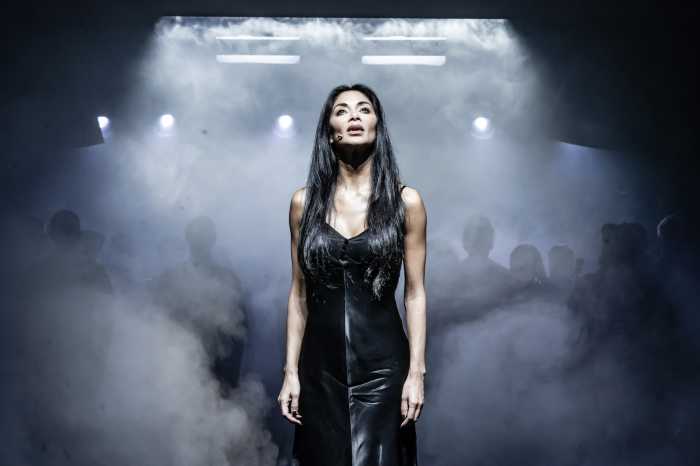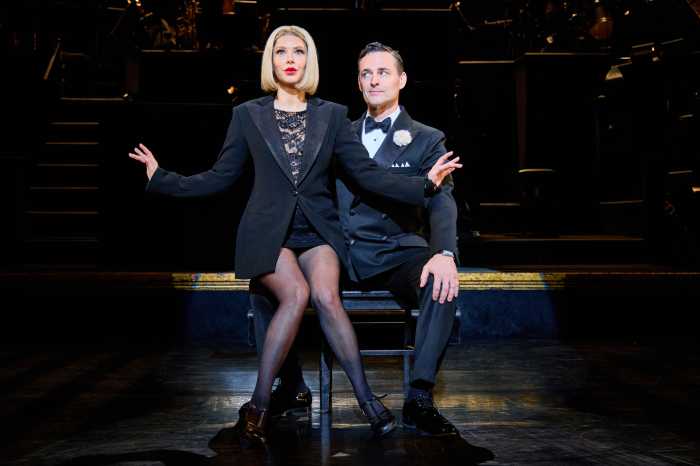Good luck making sense of “McNeal,” Ayad Akhtar’s clunky, glitchy, and pontificating new drama starring Robert Downey Jr. as a famous and egotistical writer who becomes unhealthily obsessed with artificial intelligence. The play is receiving its world premiere on Broadway in a tech-savvy production directed by Bartlett Sher, the undisputed heavy-hitter of Lincoln Center Theater.
In a fall season marked by too many celebrity appearances to keep track of, Downey Jr., who is making his Broadway debut, stands out given his A-list Hollywood status and impressive film record ranging from Marvel Universe superhero flicks to the bio dramas “Chaplin” and “Oppenheimer,” for which he won an Academy Award earlier this year.
Downey Jr. is certainly bringing a whole lot of people to Lincoln Center who would not otherwise be checking out the latest work by Akhtar, who specializes in contemporary tragedies about professionally successful men whose hubris gets the better of them, such as the Pulitzer Prize-winning “Disgraced” (about a Pakistani-American corporate attorney who loses his cool during a debate over race) and “Junk” (about a hotshot Wall Street trader modeled on Michael Milken).
Downey Jr. plays Jacob McNeal, who learns in the first scene both that he is dying of liver failure and that he just won the Nobel Prize for Literature, which segues into an over-the-top acceptance speech in Stockholm where he rails against books being written with AI, which the character describes as “odorless sewage.”
However, subsequent scenes indicate that McNeal has a history of lifting ideas for his novels from the lives of those around him and that he took the unpublished manuscript of his deceased wife and passed it off as his own work. He also asks a chatbot to cull through personal journals and literary masterworks in order to produce a new story “in the style of Jacob McNeal.” One wonders whether the scenes we are watching are really happening or if they are supposed to reflect an AI creation.
The most memorable scene is a confrontational interview between McNeal and a New York Times feature writer (Brittany Bellizeare). When the writer, who is young, female, and Black, does not immediately recall who Eric Schneiderman (the New York attorney general who resigned in 2018 following accusations of physical abuse) was, McNeal, shockingly, asks whether she was a “diversity hire.” McNeal also admits to once envying Harvey Weinstein for his mastery of power.
The other characters tend to be flat, leaving fine actors such as Ruthie Ann Miles (as McNeal’s doctor), Andrea Martin (as McNeal’s agent), and Melora Hardin (as an editor who once had an affair with McNeal) with little to work with. On the other hand, Downey Jr. gets to live it up as an outrageous, condescending, toxic figure who is supposedly also fascinating and insightful.
“McNeal” is at its best during the scene transitions, in which the stage is dominated by fluid digital projections of computer apps and deepfake technology, including a montage in which McNeal, while speaking, morphs into Ronald Reagan and then Barry Goldwater. (One of McNeal’s books centers on the notion that Reagan was an empty vessel who made the ideas of Goldwater sound glorious, reflecting the play’s theme of appropriating other people’s ideas).
Let’s give credit to Downey Jr. for coming to Broadway in a new play (rather than a revival of a classic) that attempts to wrestle with AI, a source of unprecedented technological and social upheaval and uncertainty. It is unfortunate that the play is a mess, leaving theatergoers 90 minutes of pure bewilderment along with a few nifty graphics.
Vivian Beaumont Theater, 150 W. 65th St., lct.org. Through Nov. 24.
Read More: https://www.amny.com/entertainment/theater/





































